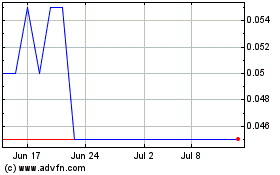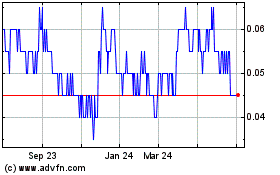Sable Resources Ltd. ("Sable" or the "Company") (TSXV:SAE |
OTCQB:SBLRF) is pleased to announce preliminary exploration results
from its new grassroots Cerro Negro project recently staked by the
Company. Cerro Negro is an early-stage project located 50km east of
Sable’s Don Julio Project, 35 km NW of Challenger Gold’s Hualilan
Project, and 34 km ENE of Minsud Resources – South32 Chita Valley
Project in the province of San Juan, Argentina.
Dr. Ruben Padilla, President and CEO of Sable
commented, “Cerro Negro was identified by Sable during its ongoing
project generation work. This project represents an opportunity for
new concealed copper resources along underexplored segments of
known fertile terrains. We have employed conceptual work and
systematic modern exploration techniques that step by step keep
suggesting the potential for finding a new Miocene blind porphyry
system. The exploration program at Don Julio is ongoing with
results from the 2023 / 2024 exploration season anticipated late
March.”
Highlights
- New project with excellent
location, infrastructure, access, and lower elevation allowing
year-round exploration work.
- 100% owned by Sable, never
explored, or drilled before.
- Located along a NW regional
structure within the fertile San Juan Miocene mineral belt.
- Geophysical, geochemical, and
alteration anomalies indicating potential for Miocene porphyry
mineralization concealed under Quaternary gravels.
Figure 1. Cerro Negro project summary looking
SSW.
Cerro Negro was staked based on the presence of
a regional magnetic anomaly under quaternary gravels. After staking
the ground, Sable conducted geological mapping finding discrete
outcrops of Miocene porphyry intrusions; additionally, Sable
completed two lines (9km) of Induced Polarization (IP) survey
finding a significant chargeability anomaly of at least 800 by 900m
on the SW margin of the magnetic anomaly; and a second, more subtle
chargeability anomaly on the NE extreme of the IP survey. Rock
sampling on available outcrops returned copper anomalies up to 0.1%
Cu associated with small quartz-carbonate structures hosted in
Ordovician sediment and containing trace amounts of chalcopyrite
and Cu oxides. Spectral analysis of rock samples collected shows
the presence of white mica, chlorite, and epidote alteration, all
of them typical of porphyry environment.
Figure 2. Location and Metallogenic Regional
Context of the Cerro Negro project.
Given the coincidence of magnetic and IP
features with localized anomalous rock samples, the company decided
to conduct a soil sampling survey using the partial extraction MMI
technique (Mobile Metal Ion) to define ionic metal anomalies
transported vertically through the gravel cover. The survey
consisted of 255 samples collected along the IP lines to compare
geochemical and geophysical responses. The MMI results show
consistent and significant anomalies of porphyry-related metals
like Cu, Au, Ag, Mo within and around the main chargeability
anomaly; traditional pathfinders such As, Sb, Tl, Te, Se, Pb, Zn
show variable anomalies in different zones of the sampled area.
Figure 3. Magnetics, Chargeability and
Resistivity distribution at the Cerro Negro Project.
Results of MMI soil sampling can be presented as
absolute values of certain element but better expressed as a
Response Ratio (RR) which represents the number of times that each
value exceeds the background. Normally RR values of 2 or less are
considered too close to the background level and therefore not
anomalous. Response Ratios of 2 to 5 times background are already
considered anomalous (SGS, Technical Bulletin 23, 2005). At Cerro
Negro response ratios of up to 70 were obtained for Au; 20 for Cu;
75 for Mo; and 96 for Ag, as well as elevated values for different
porphyry pathfinders including up to 2,400 times background for As.
Figure 3 shows the calculated response ratios for the main elements
along sampling lines 6400 and 7200.
Future Work
The Company is planning the extension of the MMI
soils and geophysical surveys over the entirety property to define
drill targets on the search of blind Miocene porphyry centers
bellow the quaternary gravels.
Figure 4. Distribution of response ratios for
main porphyry associated metals.
QUALIFIED PERSON
Luis Arteaga M.Sc. P.Geo., Vice President
Exploration is the Company's Qualified Person as defined by NI
43-101. He has reviewed and approved the technical information in
this news release.
ABOUT THE CERRO NEGRO
PROJECT
Cerro Negro is a new grassroots exploration
project product of Sable’s target generation work. Cerro Negro is
located in the province of San Juan, Argentina; 34km ENE of
Minsud’s/South32 Chita Valley Project with multiple significant
drilling intercepts including 786m @ 0.43% Cu; 0.23 g/t Au;
15.78 g/t Ag (MinSud PR. May 8, 2023); 35km NW of
Challenger Gold’s Hualilan Project which contains a resources of
2.8MOz AuEq (Challenger Gold Announcement March
29, 2023); and 50km East of Sable’s Don Julio Project which is
advancing funded by an Earn-in agreement with South32. Sable is
advancing the Cerro Negro project through systematic and modern
exploration.
ABOUT SABLE RESOURCES LTD.
Sable is a well-funded junior grassroots
explorer focused on the discovery of Tier-One new precious metal
and copper projects through systematic exploration in endowed
terranes located in favourable, established mining jurisdictions.
Sable's focus is developing its large portfolio of new Greenfields
projects to resource level. Sable is actively exploring the San
Juan Regional Program (163,969 ha) incorporating the Don Julio, El
Fierro, and Los Pumas Projects in San Juan Province, Argentina.
For further information, please contact:
Ruben Padilla, President & CEO at
ruben.padilla@sableresources.com or +1 (520) 488-2520
Related link: sableresources.com
Neither the TSX Venture Exchange nor its
Regulation Services Provider, as that term is defined in the
policies of the TSX Venture Exchange, accepts responsibility for
the adequacy or accuracy of this release.
SAMPLE PREPARATION AND QA/QC
Rock samples collected in Argentina are sent to
ALS Chemex Argentina, a subsidiary of ALS Minerals, at its facility
located in Mendoza, Argentina. Analyses are carried out at their
laboratory in Lima, Peru. Sample preparation includes drying in an
oven at a maximum temperature of 60°C, fine crushing of the sample
to at least 70% passing less than 2 mm, sample splitting using a
riffle splitter, and pulverizing a 250 g split to at least 85%
passing 75 microns (code PREP-31). The rock samples contained in
this press release were analyzed by methods Au-AA24 (Fire Assay
Fusion and Atomic Absorption Spectrometry finish) and ME-MS61 (Four
Acid Digestion with Mass Spectrometry finish); the latter includes
48 elements (Al, Ag, As, Ba, Be, Bi, Ca, Cd, Ce, Co, Cr, Cs, Cu,
Fe, Ga, Ge, Hf, In, K, La, Li, Mg, Mn, Mo, Na, Nb, Ni, P, Pb, Rb,
Re, S, Sb, Sc, Se, Sn, Sr, Ta, Te, Th, Ti, Tl, U, V, W, Y, Zn, Zr).
Both digestion methods dissolve most minerals but not all elements
are quantitatively extracted in some sample matrices. Control
samples (standards, blanks, and duplicates) are inserted
systematically, and their results are evaluated according to the
Company protocols.
Soil samples were collected following the
protocols recommended by SGS Minerals. The samples were submitted
to SGS labs in San Juan Argentina and subsequently analyzed at SGS
in Lima, Peru. The MMI technique is a partial extraction method
oriented to determine elements in ionic state. The MMI methodology
has proven to be particularly useful for finding buried
mineralization and multiple successful study cases can be found in
the literature. After extraction, the samples are analyzed for 54
elements (code MMI-ME).
CAUTION REGARDING FORWARD-LOOKING
STATEMENTS
Certain statements contained in this press
release constitute forward-looking information. These statements
relate to future events or future performance. The use of any of
the words "could", "intend", "expect", "believe", "will",
"projected", "estimated" and similar expressions and statements
relating to matters that are not historical facts are intended to
identify forward-looking information and are based on Sable’s
current belief or assumptions as to the outcome and timing of such
future events. Actual future results may differ materially.
Although such statements are based on reasonable assumptions of
Sable’s management, there can be no assurance that any conclusions
or forecasts will prove to be accurate.
While Sable considers these assumptions to be
reasonable based on information currently available, they may prove
to be incorrect. Forward-looking information involves known and
unknown risks, uncertainties and other factors which may cause the
actual results, performance or achievements to be materially
different from any future results, performance or achievements
expressed or implied by the forward-looking information. Such
factors include risks inherent in the exploration and development
of mineral deposits, including risks relating to changes in project
parameters as plans continue to be redefined, risks relating to
variations in grade or recovery rates, risks relating to changes in
mineral prices and the worldwide demand for and supply of minerals,
risks related to increased competition and current global financial
conditions and the COVID-19 pandemic, access and supply risks,
reliance on key personnel, operational risks, and regulatory risks,
including risks relating to the acquisition of the necessary
licenses and permits, financing, capitalization and liquidity
risks.
The forward-looking information contained in
this release is made as of the date hereof, and Sable is not
obligated to update or revise any forward-looking information,
whether as a result of new information, future events or otherwise,
except as required by applicable securities laws. Because of the
risks, uncertainties and assumptions contained herein, investors
should not place undue reliance on forward-looking information. The
foregoing statements expressly qualify any forward-looking
information contained herein.
Figures accompanying this announcement are available
at:
https://www.globenewswire.com/NewsRoom/AttachmentNg/353901d7-c1cd-4289-8edb-2c18fee7ba2d
https://www.globenewswire.com/NewsRoom/AttachmentNg/2f6322e3-6039-46fa-af6e-c8b99a2d1730
https://www.globenewswire.com/NewsRoom/AttachmentNg/650a9a02-974d-49b2-b658-6981f946c98c
https://www.globenewswire.com/NewsRoom/AttachmentNg/614a6145-62d0-43a2-aa0f-b5794832de4d
Sable Resources (TSXV:SAE)
Historical Stock Chart
From Oct 2024 to Nov 2024

Sable Resources (TSXV:SAE)
Historical Stock Chart
From Nov 2023 to Nov 2024
